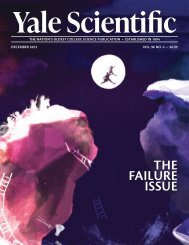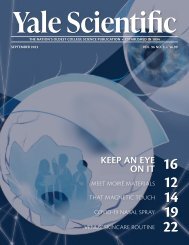YSM Issue 94.3
Create successful ePaper yourself
Turn your PDF publications into a flip-book with our unique Google optimized e-Paper software.
FOCUS
Psychology
PHOTOGRAPH BY HANNAH HUANG
Praveen Suthaharan, a member of the Corlett Lab, poses underneath a series of brain artwork.
A Pandemic of Paranoia
Constantly wearing a mask to protect
each other from a virus we cannot even see
with our own eyes, against a disease that
is in many cases asymptomatic, can
be overwhelming—enough to
put anyone on edge. Previously
mundane activities, like going
to the grocery store or
visiting grandparents,
now draw concerns: just
by doing them, one could contract
or transmit a potentially fatal disease.
The study’s authors saw that paranoia
significantly increased throughout the
duration of the COVID-19 pandemic,
with self-reported paranoia levels
peaking as states drew closer to
reopening. Overall effects on other
mental illnesses were also negative. “We
have all experienced challenges since
the onset of the pandemic, and we also
noticed this in our data: that over time,
depression and anxiety increased during
the lockdown,” Corlett said.
Ensuring that the general public
remains calm and willing to work
together is essential to overcoming a
crisis such as the COVID-19 pandemic,
especially in efforts like vaccination
and social distancing. While many have
argued for and against the merits of
mandatory lockdowns, this study’s data
demonstrate that divergence in statelevel
response correlated with differential
increases in paranoia—both selfreported
and measured via laboratory
tasks. Vigorous, proactive lockdown
policies were associated with less
paranoia when compared to
lax lockdown policies. One
may similarly expect to
see different outcomes
based on states’ varying
mask mandates, Corlett posited.
To Mask or Unmask
Over a year into the pandemic, wearing
a mask while around others should
seem like a no-brainer. Masks are cheap,
effective, and easy to wear. Suthaharan’s
team was interested in understanding
why so many people were and are still
opposed to wearing a mask, despite the
seemingly clear cost-benefit analysis for
doing so. “It’s similar to when you see a
patient smoking a cigarette outside of
the hospital,” Corlett said. “We wanted
to understand why people engage in
behaviors risky for their health.”
In their study, the researchers found
that paranoia was highest during
reopening in states that required maskwearing.
This supports the notion that, in
social settings, humans are “conditional
cooperators”—we tend to follow rules
as long as we perceive others doing the
same. As soon as this is no longer true,
we tend to stop following these rules. As
the data suggested, when there was a mask
mandate but people saw others without a
mask, that raised confusion and paranoia.
In fact, individuals with paranoia were
far more reluctant to wear masks and
reported wearing them significantly less.
Suthaharan wanted to know whether
mask mandates themselves
could have contributed to the
increased mental health
issues experienced
during the pandemic.
To that end, his team
performed a type of analysis
called “difference-in-differences,”
which allowed them to infer causal
relationships by comparing changes
in paranoia levels in states that
implemented a mask mandate to
states that did not, or only recommended
it. The analysis revealed that mandated
mask-wearing was associated with a forty
percent increase in paranoia levels.
These results could be connected
to a lack of clarity in public health
messaging, Corlett conjectured. Early
in the pandemic, health organizations
such as the CDC and WHO did not
fully support masking, even claiming
inefficacy at times. Later, emerging
evidence supported a reversal in opinion,
which in turn led to mask shortages and
induced worries among people who were
now unsure about whether they would
be able to get masks.
The uncertainty and paranoia caused
by mask mandates possibly led to distrust
of public health organizations as maskwearing
became a politicized topic. “In no
other time in history have we experienced
a pandemic this problematic, and instead
of dealing with it as a community of likeminded
people, what we’ve done is double
down on our differences,” Corlett said.
All in This Together
If there is any comfort
to be taken by those
who have experienced
mental
health
difficulties since the
14 Yale Scientific Magazine October 2021 www.yalescientific.org

















